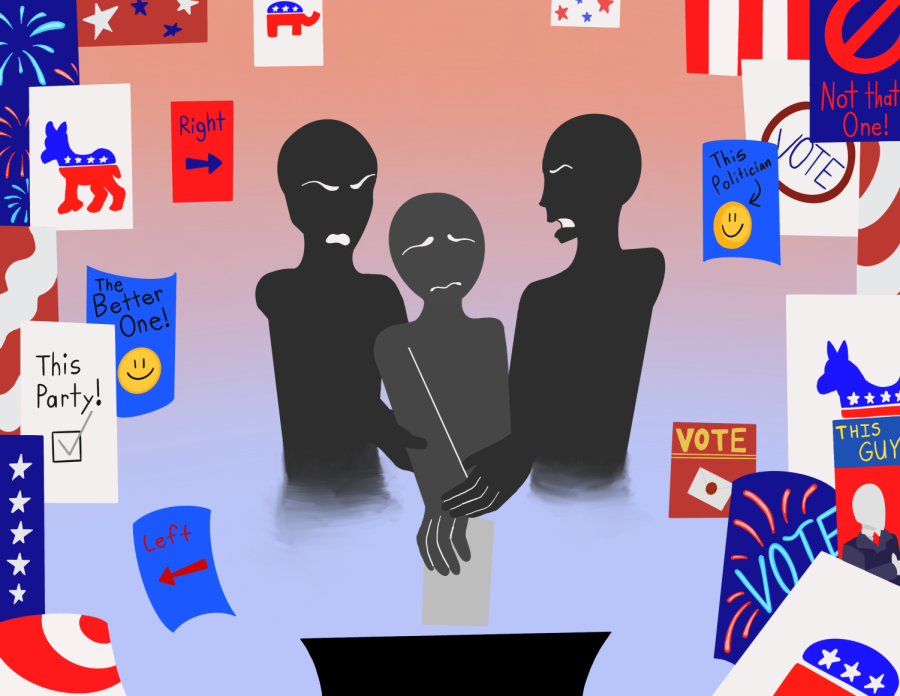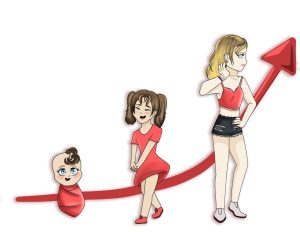Children should form their own political beliefs instead of blindly following their parents
Many students feel the pressure of not only society to side with a political party, but also with their parents. Students should develop beliefs independent of their parents.
December 14, 2022
We inherit many traits from our parents—eye color, hair color and mannerisms. However, recent research suggests that parents pass on more than just their genetic code; they also tend to pass their political ideology on to their children.
In modern society, politics can be difficult to avoid, as political discussions are constantly trending in the news, on social media and are present throughout daily conversations. The overall growing participation in politics has led many children to become involved in the political conversations. Today’s youth often have to choose whether to blindly follow the beliefs of their parents or form their own political opinions.
For many children, their parents are their biggest role models; parents often have the biggest impact on their child’s life, as well as their beliefs. The famous 1961 Bobo Doll experiment, conducted by Stanford professor Albert Bandura, proved this idea by demonstrating that children will interact with others in the same way that was modeled for them by adults.
Often, young children are easily impressionable and have a tendency to pick up on the words and behaviors that they observe being used around them. If a parent is clearly supporting a particular political party, it is likely that the child will want to do the same. As a result of the experiment, the prevailing view since the 1950s is that children passively adopt their parent’s political affiliation.
One of the main factors that can impact an individual’s political identity is being influenced by others’ opinions and beliefs. Many parents try to instruct their children and impart their views, perhaps hoping their kids will become carbon copies of themselves, or become the people they wish they were. Some children will end up following what their parents tell them to believe, while others will do the opposite, totally disregarding the beliefs of their parents.
It is understandable that parents with strong beliefs would feel that it is their duty to see their children adopt those same beliefs. However, this rarely works out the way that parents hope. A 2020 study published in the British Journal of Political Science found that parents who are insistent that their children adopt their political views inadvertently influence their children to abandon the belief once they become adults.
The mechanism is perhaps surprising. Because children who come from homes where politics are a frequent topic of discussion are more likely to talk about politics once they leave home, they are more likely to be exposed to new viewpoints, enabling them to then adopt new ideologies with a surprising frequency.
When parents have extreme world views, their children have the clear choice to either side with their parents through agreement or against their parents through disagreement. This is well explained by Carl Pickhardt, an author and child psychologist.
“Extremely rigid views of right/wrong, trust/distrust, love/hate can be embraced by children who want to stay connected to parents, and can be cast off by children who, for their own independence, are willing to place the parental relationship at risk,” Pickhardt said in a 2019 interview published in Insider.
If the parents try too hard to teach their own beliefs as established truth, this teaching can be quickly set aside when the children have strong political awakenings of their own.
This is why it is extremely important for parents to focus less on forcing a political party onto their child and more on ensuring that their child has all the tools they need to make an educated decision for themselves. Politics addresses a wide range of subjects and can be difficult to understand, which is why children deserve to be taught about politics in an unbiased manner.
Some children may be fearful that their parents or family members may treat them differently if they support a different political party than them. This can result in kids deciding to follow what their parents tell them as they believe it is the only thing for them to do because they may not be accepted otherwise.
In families where the parents and children have split alliances with political parties, there can be tension and discomfort that can cause the child to feel like their opinions are not welcome. Especially in today’s society where political parties have become extremely polarizing and the government has been acting very partisan, it is important that parents allow their children to form their own beliefs without fear.
After following your family’s beliefs for so long and constantly being reinforced that their opinions are right, it can be difficult for children to go out and form their own opinion. This can lead to children continuing to follow these beliefs way into their adult life when they are able to vote before ever really deciding what beliefs they personally agree with compared to those their family does.
While it may seem instinctive for children to believe everything that their parents tell them, it has never been more important for children to take the time to develop their own political beliefs than it is now.
No two people are the same, and with so many controversial debates going on in our society, it is not uncommon to have a wide range of differing opinions that don’t align fully with either party. Oftentimes, parents will teach only what they think is right without mentioning the opposing side. However, this leaves children with a very limited view of the world.
It is incredibly important for students to educate themselves on politics because when they are 18 they will be able to vote. Students should think about how politics affect them, compared to how they affected their parents, compared to how they affected their grandparents.
Children are different individuals than their parents; the problems that younger generations face are not the same problems that adults face. The generational gap between children and their parents is significant enough that the political views of parents may not always align with the problems that are affecting the current generation.
Adolescents deserve the opportunity to follow what they personally believe in. Children should not be expected to inherit their parents’ political expectations, nor should they be disregarded for having their own ideas. Parents should be loving and accepting of whatever beliefs their children take on, even if they don’t align with their own.
In a society crowded by a wide array of available influences, we should be pushing our children to strive to be knowledgeable and informed in order to develop opinions, rather than simply indoctrinating them with our own. People of every age deserve the opportunity to formulate their own beliefs and opinions without being forced to follow specific ideologies.











